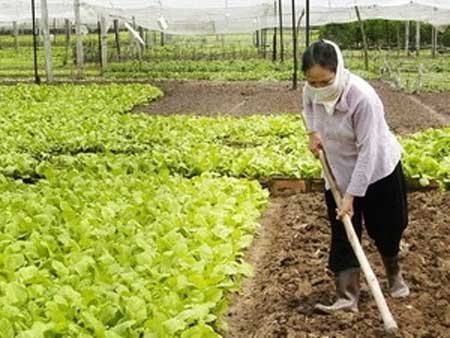|
Farmers need foreign technologies for ‘clean’ produce exports

In April
2015, Japanese Showa Denko injected $1 million into a farm that makes clean
vegetables in Ha Nam Province with LED lamp technology, which helps
vegetables grow 2.5 times faster than natural light.
In mid-March 2015, the Dong Thap People’s Committee and South Korean KRC Group signed a memorandum of understanding on developing infrastructure for agriculture and rural development. The project is expected to be implemented over 50 years on a total area of 28,000 hectares in the districts of Tam Nong, Thanh Binh, Thap Muoi and Cao Lanh under the mode of PPP (private public partnership). The capital will be from non-refundable aid, loans from Korean banks and investments from domestic and foreign businesses. This is the second and largest cooperation project in the field, which, in terms of operation scale, is much larger than the one developed by JC Vietnam Group and Ninh Thuan provincial authorities. An analyst noted that while South Korean investors are eyeing Ninh Thuan and Dong Thap provinces, Japanese are interested in projects in Lam Dong, a The Japan International Cooperation Agency (JICA) is now helping Lam Dong build an industry-agricultural production complex with a focus on the vegetable & fruit growing projects. In 2013, the $1 million ‘Japanese miraculous village in Da Lat’ project kicked off in the city of Tadahiko Fujiwara, mayor of Kawakami village, known for its high-quality lettuce production, said that Da Lat has a huge opportunity compared to other regional countries to become the “Asian vegetable hub”. In February 2014, the first products made with Japanese technology are sold at Aeon, Big C and Co-op Mart retail chains and Japanese restaurants in An Phu Lacue, the project developer, has been exporting the vegetables to The company grows vegetables on its 13 hectares of land, and uses the same production model in the land area owned by local households. An Phu Lacue has said that it will grow vegetables with Japanese technology on an area of 100 hectares by 2016 in order to increase the profitability ratio. However, the quality of the vegetables there is only equal to 80 percent of the products in Kawakami village since it lacks necessary infrastructure items. DNSG |
Chủ Nhật, 28 tháng 6, 2015
Đăng ký:
Đăng Nhận xét (Atom)
Không có nhận xét nào:
Đăng nhận xét